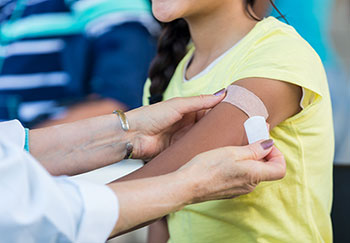
It’s that time of year again. Football is a major topic of conversation at the office. The leaves have turned bright shades of red and orange. It’s also time to get your flu shot, if you haven’t already.
Sure, the flu vaccine isn’t fun, like leaf-gazing and football games, but it helps keep you and those around you healthy during flu season. Susan Werner, MD, a pediatrician at UVA Pediatrics Culpeper and regional medical director of UVA’s primary care clinics in central Virginia, provided us with some flu vaccine facts.
Why Get a Flu Vaccine?
“Flu is the leading preventable cause of infectious death in the U.S.”, says Werner. About 12,000 – 79,000 people die in this country from the flu each year, according to the CDC. In 2018-2019, deaths from the flu were at the high-end of this range.
“Last year’s (2018-2019) flu season had a long duration, with several different strains of the flu virus, and the vaccine didn’t protect against all of them,” said Werner. She also warned that this year could see similar long-lasting flu season, with the first reported cases in September. Still, the best way to protect yourself and family is to get a flu shot.
Most people experience no side effects from the vaccine and the risk of experiencing side effects is much smaller than the risk of getting the flu or suffering complications from the flu.
Do You Need a Flu Shot Every Year?
Yes, because the vaccine changes each flu season based on the strains of flu that are prevalent that year. The flu virus is constantly changing and the vaccine changes along with it. It is recommended that you get the flu shot in late September or October, though if you forget, you can still get the vaccine later in the flu season.
Full protection from the shot doesn’t take effect until 5-10 days after you get the vaccine, so if you’re traveling, you might want to keep that in mind.
Who Should Get a Flu Shot?
Everyone aged 6 months and older should get a flu vaccine. It is especially important for anyone who is at high risk for complications from the flu. According to the CDC, that includes:
- Young children
- Adults over 65
- Pregnant women
- Nursing home residents
- Adults with chronic conditions, like heart or lung disease, asthma, cancer or diabetes
It’s also very important to get vaccinated if you live or interact with any high-risk individuals on a regular basis.
If you get the flu, most healthy individuals recover within 5 to 7 days. Werner advises that you can also discuss with your doctor whether the severity of your symptoms warrants the use of an antiviral medication. Effectiveness of antivirals goes down when the medicine is used widely within our communities.
Who Should NOT Get a Flu Vaccine?
Those who shouldn’t get a vaccine include:
- People with a severe allergy to any ingredients in the vaccine
- Those who’ve had a previous severe reaction to the vaccine
- Children younger than 6 months of age
You also shouldn’t get the shot if you have a fever. Wait until you feel better before you get it. Talk to your doctor if you’re concerned about an allergy or if you’ve ever had Guillain-Barré Syndrome.
What About Vaccine Side Effects?
Side effects are rare, but usually begin soon after you get the shot and they last for one or two days.
Get the Flu Vaccine: It’s Not Too Late
Call your doctor’s office to make an appointment. Many of our clinics will have flu shot clinics separate from regular appointments. These clinics vary by location, so call your doctor’s office to see what’s available.
If you’re not a UVA primary care patient, you can find out more about our primary care services. If you live in Central Virginia, chances are we have a location that’s convenient for you.
Side effects include:
- Soreness and swelling at the injection site
- Hoarseness
- Red, itchy eyes
- Cough
- Fatigue
- Fever
- Aches
- Headache
Moderate and severe problems are very rare. You can find out more about these side effects at the CDC site.
Intranasal Flu Vaccine: Another Option
Anyone ages 2-49 can get the intranasal flu vaccine, which contains live, but weakened, flu virus. The intranasal vaccine is sprayed into your nostrils. This might be a good option for children (or adults) who are scared of needles. Werner says it’s a little bit more likely to cause flu-like symptoms because it’s a live virus, which is why it’s not recommended for the very young or other high-risk patients.
Where to Get the Flu Vaccine
If you’re a patient at one of UVA’s primary care practices, you can call to make an appointment for the flu shot. You can also get the shot at local pharmacies or your local health department.
“The important thing is getting the flu shot. Our goal is to get as many people vaccinated against the flu as possible,” says Werner.
We originally published this blog post in 2012 and updated it in November 2019.


Why is it that no one promoting the flu vaccine discloses the devastating adverse reactions to the flu vaccine including Guillain-Barre, other severe neurological illnesses and even death? My wife had an extremely severe reaction to the 2010 flu vaccine which involved her peripheral and central nervous systems. She went into a coma for nearly a month and spent 3 months in physical rehab learning how to walk, talk, eat and everyother normal human function. Regardless of how “rare” these reactions are, they should be disclosed. It is dishonest of you to simply brush these side effects off. I had to battle extremely intelligent neurologists for nearly a month before they conceded my wife was experiencing a reaction to the flu vaccine. When they finally agreed, they administered plasma pharesis and my wife’s recovery began.
We’re sorry you and your wife had to go through that and we’re glad she is recovering. This blog post does warn that the following people should NOT get a flu vaccine:
• People with a severe allergy to chicken eggs
• Those who’ve had a previous severe reaction to the vaccine
• Children younger than 6 months of age
• Those with a history of Guillain-Barre Syndrome
The federal government’s flu.gov site also provides more in-depth information about side effects of the flu shot.
Received 2012 / 2013 flu shot on 15th Dec. 2012. After 10 days felt numbness in the hand while holding things like lap top for say ten minutes. Few weeks later the thumb, index and middle finger have slight numbness, all the time without holding anything. Surperisingly, since last few days,half of the left lower and upper lip feel numb and a bit warm for a short period, three or four times. Now this is worrying me.
I am going to see health provider soon, any information from readers is welcome.